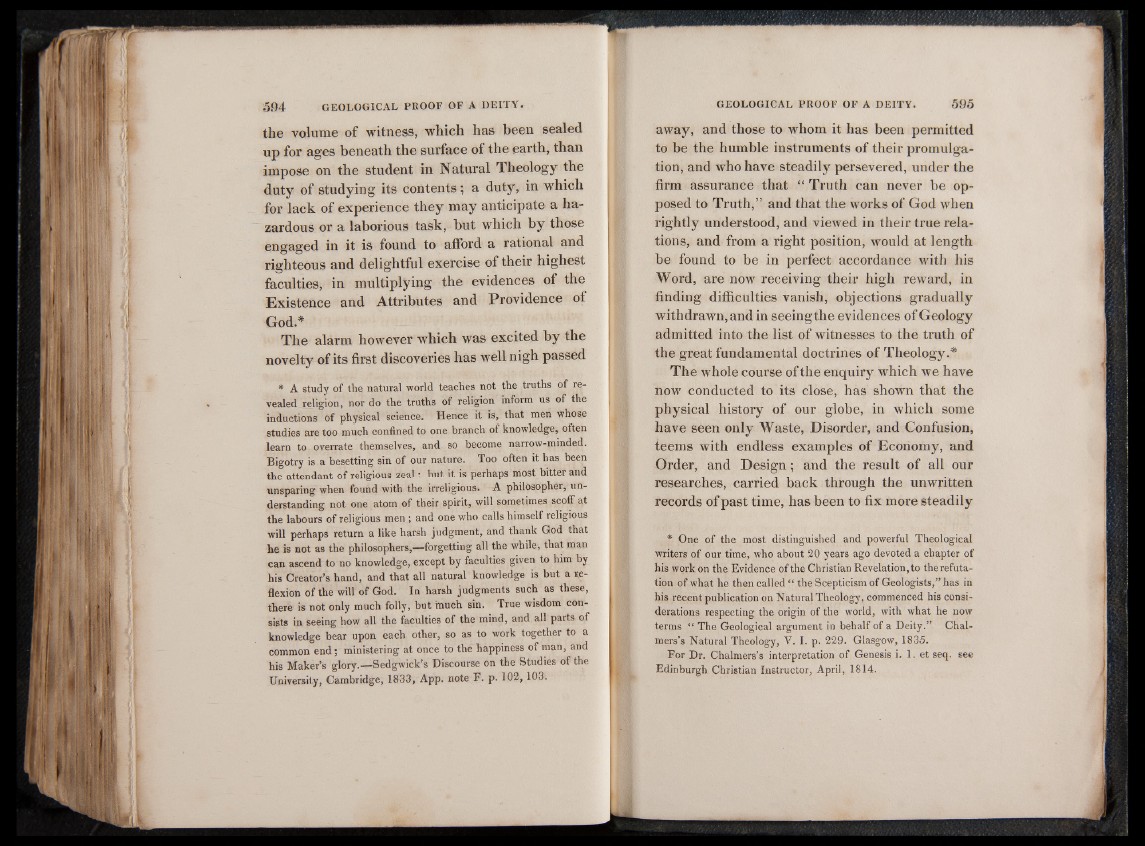
the volume o f witness, which has been sealed
up for ages beneath the surface of the earth, than
impose on the student in Natural Theology the
duty o f studying its contents; a duty, in which
for lack, o f experience th ey may anticipate a hazardous
or a laborious task, but which b y those
engaged in it is found to afford a rational and
righteous and delightful exercise o f their highest
faculties, in multiplying the evidences o f the
E x isten ce and Attributes and Providence of
God.*
The alarm however which was excited b y the
novelty of its first discoveries has well nigh passed
* A study of the natural world teaches not the truths of revealed
religion, nor do the truths of religion inform us of the
inductions of physical science. Hence it is, that men whose
studies are too much confined to one branch of knowledge, often
learn to overrate themselves, and so become narrow-minded.
Bigotry is a besetting sin of our nature. Too often it has been
the attendant of religious z ea l: but it is perhaps iriost bitter and
unsparing when found with the irreligious. A philosopher, understanding
not one atom of their spirit, will sometimes scoff at
the labours of religious men ; and one who calls himself religious
will perhaps return a like harsh judgment, and thank God that
he is not as the philosophers,—forgetting all the while, that man
can ascend to no knowledge, except by faculties given to him by
his Creator’s hand, and that all natural knowledge is but a reflexion
of the will of God. In harsh judgments such as these,
there is not only much folly, but touch sin. True wisdom consists
in seeing how all the faculties of the mind, and all parts of
knowledge bear upon each other, so as to work together to a
common end; ministering at once to the happiness of man, and
his Maker’s glory.—Sedgwick’s Discourse on the Studies of the
University, Cambridge, 1833, App. note F. p. 102,103.
away, and those to whom it has been permitted
to be the humble instruments o f their promulgation,
and who have steadily persevered, under the
firm assurance that “ Truth can never be opposed
to Truth,” and that the works of God when
rightly understood, and viewed in their true relations,
and from a right position, would at length
be found to be in perfect accordance with his
Word, are now receiving their high reward, in
finding difficulties vanish, objections gradually
withdrawn, and in seeingthe evidences of Geology
admitted into the list o f witnesses to the truth o f
the great fundamental doctrines o f Theology.*
The whole course of the enquiry which we have
now conducted to its close, has shown that the
physical history o f our globe, in which some
have seen only Waste, Disorder, and Confusion,
teems with endless examples of Economy, and
Order, and Design ; and the result o f all our
researches, carried back through the unwritten
records o f past time, has been to fix more steadily
* One of the most distinguished and powerful Theological
writers of our time, who about 20 years ago devoted a chapter of
his work on the Evidence of the Christian Revelation, to the refutation
of what he then called “ the Scepticism of Geologists,” has in
his recent publication on Natural Theology, commenced his considerations
respecting the origin of the world, with what he now
terms “ The Geological argument in behalf of a Deity.” Chalmers’s
Natural Theology, V. I. p. 229. Glasgow, 1835.
For Dr. Chalmers’s interpretation of Genesis i. 1. et seq. see
Edinburgh Christian Instructor, April, 1814.